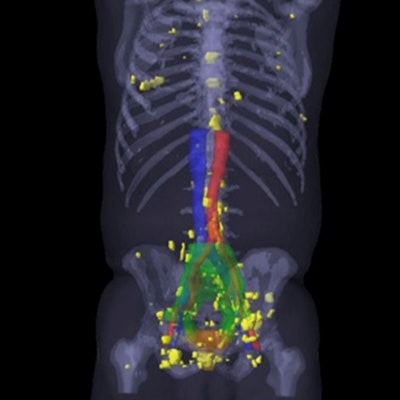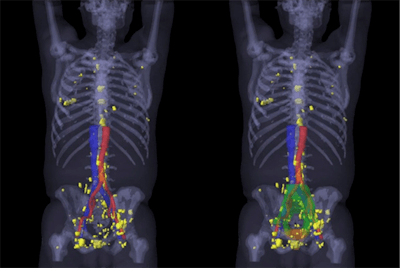
PET/CT imaging with gallium-68 (Ga-68) prostate-specific membrane antigen (PSMA-11) could help in the early detection and treatment of recurrent prostate cancer after a patient undergoes radical prostatectomy, according to a study in the February issue of the Journal of Nuclear Medicine.
Researchers from the U.S. and Germany believe PSMA-PET/CT could help direct salvage radiotherapy in the 20% to 80% of patients who experience a biochemical recurrence of the disease within 10 years of radical prostatectomy.
Currently, salvage radiotherapy is the main option for treatment; however, imaging modalities often are not sensitive enough to identify the location of recurrence until it is too late. Making the situation more difficult is the lack of clearance for PSMA-PET/CT by the U.S. Food and Drug Administration (FDA).
Lead author Dr. Jeremie Calais, from the University of California, Los Angeles (UCLA), and colleagues believe that PSMA-PET/CT is sufficiently sensitive to locate the recurrent prostate cancer early enough to possibly guide salvage radiotherapy or direct patients to the most appropriate follow-up treatment.
The international, multicenter study included 270 patients from UCLA, the Technical University of Munich, the Ludwig Maximilian University of Munich, and the University of Essen. The subjects had a recurrence of prostate cancer after radical prostatectomy but had not received prior radiotherapy. PSMA-PET/CT was performed at a serum prostate-specific antigen (PSA) level of less than 1 ng/mL (JNM, February 2018, Vol. 59:2, pp. 230-237).
 3D map of the PSMA-positive lesions (yellow) in the 52 patients with recurrent prostate cancer outside of the consensus clinical target volume. Image courtesy of Calais et al and JNM.
3D map of the PSMA-positive lesions (yellow) in the 52 patients with recurrent prostate cancer outside of the consensus clinical target volume. Image courtesy of Calais et al and JNM."The first sign of prostate cancer recurrence is a rising PSA," Calais explained in a statement from the Society of Nuclear Medicine and Molecular Imaging (SNMMI). "For salvage radiotherapy to be successful, it should be initiated before the PSA rises above 1 ng/mL, and ideally, closer to 0.2 ng/mL or lower."
The researchers found that 132 patients (49%) had a positive PSMA-PET/CT result, and 52 (19%) had at least one PSMA-positive lesion outside of the consensus clinical target volume (CTV). The two most common PSMA-PET-positive lesion locations outside the consensus radiation fields were in the bone (23, 44%) and perirectal lymph nodes (16, 31%).
"Salvage radiotherapy is only curative if recurrent disease is completely encompassed by the radiotherapy fields," Calais said. "Therefore, in almost 20% of these patients, the addition of PSMA-PET/CT would have a potentially major impact on the outcome of salvage radiotherapy."
The researchers believe that PSMA-PET/CT will eventually become part of the standard of care for prostate cancer patients with biochemical recurrence. They recommended a randomized imaging trial of salvage radiotherapy with or without PSMA-PET/CT to investigate its effects on treatment outcome.




















